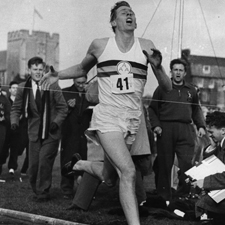Perception is Reality
May 6th, 1954—sixty years ago this past Tuesday—Roger Bannister did what many thought was impossible: he ran a mile in under four minutes.
The four-minute barrier was long considered unbreakable. It was akin to breaking the sound barrier, climbing Mount Everest, or walking on the moon. There was a strong belief that covering a mile in under four minutes was like trying to run through a brick wall: it was simply not physiologically possible. However, a twenty-five-year-old English medical student from Oxford thought otherwise, and he set out to take down the insurmountable.
 I often tell my athletes that perception is reality. The way you perceive something becomes your reality. If you view running a half marathon as impossible, well then, it probably will be. You have already set your mind against yourself. It takes belief in yourself, your training, and your abilities to achieve your goals. Bannister believed from his medical studies that there was nothing prohibiting the human body from running a four-minute mile. He perceived it as a possibility, so he designed a plan to make it a reality.
I often tell my athletes that perception is reality. The way you perceive something becomes your reality. If you view running a half marathon as impossible, well then, it probably will be. You have already set your mind against yourself. It takes belief in yourself, your training, and your abilities to achieve your goals. Bannister believed from his medical studies that there was nothing prohibiting the human body from running a four-minute mile. He perceived it as a possibility, so he designed a plan to make it a reality.
Bannister is an inspiring example for us because he was, in many ways, very similar to us. He ran during his lunch hour, which was his only break during a full workday as a medical student. He met up with his coach and two running friends (who helped pace him) on weekends at a local corner pub, often for beans and toast. On the day he broke the legendary barrier, he took the train to town and ate ham salad at a friend’s house. Imagine an athlete today following the same training and racing regimen. Can you imagine Meb—along with his band of coaches, physiologists, psychiatrists, and dieticians—preparing for Boston by sitting down to a plate of baked beans at Applebee’s? Would his coaches have let him meet up with friends for lunch just before the biggest race of his life? Bannister’s scheduling leading up to his race sounds a whole lot more like you and me getting read for a 5K than a professional athlete preparing to do what no human had ever done before.
As I said, perception is reality. How often have you gone into a race worried? How often have you talked yourself out of a great performance? Or worse, how often have you talked yourself into a poor performance? Our thoughts become self-fulfilling prophecies. Our best races come when we are relaxed and confident. Rather than expecting a hiccup to occur, focus on the positives. Don’t let external distractions inhibit your perception of your capabilities. As the ancient Chinese philosopher Zhuangzi put it so wisely (as ancient philosophers often do), “An archer competing for a clay vessel shoots effortlessly, his skill and concentration unimpeded. If the prize is changed to a brass ornament, his hands begin to shake. If it is changed to gold, he squints as if he were going blind. His abilities do not deteriorate, but his belief in them does, as he allows the supposed value of an external reward to cloud his vision.”
The morning of May 6th, 1954, was a blustery one with winds gusting up to twenty miles per hour. Wind was Bannister's biggest worry in his preparation. Everything within his control was set for him to take on history. About thirty minutes before his race, the wind slackened just a bit. The decision was made to go for it. With Chris Brasher pacing him the first couple of laps, Bannister came through the half-mile mark in 1:58. Chris Chataway then took pacing duties through the third lap, reaching it in just under 3:01. With three hundred yards to go, Bannister took out after the goal of seeing who would prevail: immovable object or unstoppable force.
The four-minute barrier fell.
A feat that was once thought impossible had been achieved. Once Bannister shattered the perception that the four-minute barrier was unbreakable, the feat was accomplished sixteen more times over the next three years. In fact, Bannister’s record lasted only forty-six days. His accomplishment opened the door for others to find the belief and strength needed to take down a time they had previously considered impossible.
Many times, the same thing happens to us. Once we break through a barrier or break out of a plateau, we consistently better those times. Often, a fast performance is only as  tough as we perceive it to be.
tough as we perceive it to be.
In honor of a man who went on to be knighted Sir Roger Bannister (for his work in medicine, no less), change your perception of what you can do and what you can be. Make your old impossible your new reality.
Good Luck and Happy Racing!
Coach Cary
Tim Cary is FLEET FEET's Assistant Training Manager, coach of the FLEET FEET-sponsored Runnababez Elite team, and manager of the FLEET FEET Racing Team. Over his 20 years of coaching, Tim has coached athletes to three national team championships, five national individual championships, two national records, and numerous All-American and All-State honors. Click here to receive Tim's weekly article via email.
Connect With Us
see the latest from Fleet Feet St. Louis